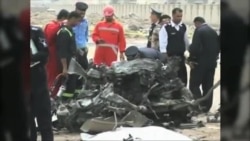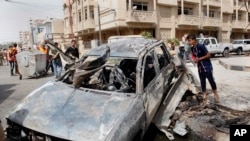BAGHDAD —
A series of car bombings in the Iraqi capital has killed more than 50 people and wounded at least 200. The attacks come on the tenth anniversary of the U.S.-led invasion that toppled the regime of Saddam Hussein.
Rescue workers rushed to aid the mostly civilian casualties as the bombs detonated at regular intervals during the height of the morning rush hour Tuesday.
A security clampdown at the city's hundreds of checkpoints caused large traffic jams in certain areas.
Residents said it was the largest number of attacks in a single day in several years.
A few days earlier, bombings in southern Iraq killed 10 people and coordinated multiple attacks on government buildings in Baghdad killed dozens more.
Many people viewed the attacks as a statement by government opponents that their violent resistance would continue.
Photo Gallery: Iraq Bombings
The bombings, mostly in Shia-dominated areas, also raised worries of a surge of sectarian-based violence on the tenth anniversary of the U.S.-led invasion of Iraq. More than 100,000 people died during the war and the armed resistance and sectarian conflicts that followed it.
The conflicts have aggravated tensions between some members of Iraq's Sunni and Shi'ite communities as well as with ethnic Kurds who have an autonomous region in northern Iraq.
Islamist extremists affiliated with al-Qaida also stage attacks as part of their campaign to undermine the Shi'ite-led government.
The head of Baghdad's Center for Political Analysis, Hadi Jallo Made, says a few Iraqis are prepared to use violence to advance their political, religious or ideological agendas.
He says such differences could push these groups to a sectarian-based conflict, but not the Iraqi people. He says most Iraqis hate this violence by militia and groups with radical ideologies.
Ordinary Iraqis, like coffee shop owner Haitham Bashar, say the lack of security is hurting the economy, still struggling to recover from decades of war and economic sanctions.
He says there is no movement in the market because the situation is so bad, the lack of security, bad government policies, the politicians.
Ten years after the fall of Saddam Hussein, many Iraqis are angry over the lack of security, weak public services and bickering among politicians.
Some say life was better under Saddam's sometimes brutal dictatorship. But most say they do not want to return to the conflicts of recent years.
Rescue workers rushed to aid the mostly civilian casualties as the bombs detonated at regular intervals during the height of the morning rush hour Tuesday.
A security clampdown at the city's hundreds of checkpoints caused large traffic jams in certain areas.
Residents said it was the largest number of attacks in a single day in several years.
A few days earlier, bombings in southern Iraq killed 10 people and coordinated multiple attacks on government buildings in Baghdad killed dozens more.
Many people viewed the attacks as a statement by government opponents that their violent resistance would continue.
Photo Gallery: Iraq Bombings
The bombings, mostly in Shia-dominated areas, also raised worries of a surge of sectarian-based violence on the tenth anniversary of the U.S.-led invasion of Iraq. More than 100,000 people died during the war and the armed resistance and sectarian conflicts that followed it.
The conflicts have aggravated tensions between some members of Iraq's Sunni and Shi'ite communities as well as with ethnic Kurds who have an autonomous region in northern Iraq.
Islamist extremists affiliated with al-Qaida also stage attacks as part of their campaign to undermine the Shi'ite-led government.
The head of Baghdad's Center for Political Analysis, Hadi Jallo Made, says a few Iraqis are prepared to use violence to advance their political, religious or ideological agendas.
He says such differences could push these groups to a sectarian-based conflict, but not the Iraqi people. He says most Iraqis hate this violence by militia and groups with radical ideologies.
Ordinary Iraqis, like coffee shop owner Haitham Bashar, say the lack of security is hurting the economy, still struggling to recover from decades of war and economic sanctions.
He says there is no movement in the market because the situation is so bad, the lack of security, bad government policies, the politicians.
Ten years after the fall of Saddam Hussein, many Iraqis are angry over the lack of security, weak public services and bickering among politicians.
Some say life was better under Saddam's sometimes brutal dictatorship. But most say they do not want to return to the conflicts of recent years.
Loading timeline...






